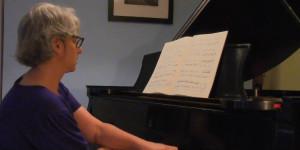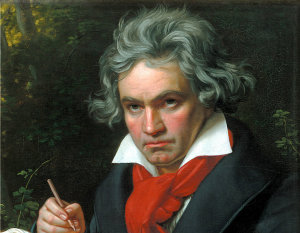I first learned Beethoven’s Appassionata over a decade ago. After the music had grown rusty and I could no longer play it, I would occasionally play the first few measures and think, this is one of the most gorgeous pieces; I should work on it again. It is so passionate; the emotions just soar. So I decided to relearn it.
As always for me when I study a piece of music, the technical challenges seem the greatest. In the Appassionata’s second movement, I think I was slow to recognize how the tempo needs to be maintained with the tension growing until it peaks at the very end. If I were to continue to work on it, that’s what I would focus on. I have recently heard faster performances, and I think an increase in tempo would make it better, and I expect that would also be challenging.
Matthew Harre, my piano teacher, likes to point out that an audience cannot hear what the performer is not hearing, that the performer must make the melody and intent so clear that audience members do not have to work hard to discern those elements. I think that advice was particularly helpful with the Appassionata’s second movement because the melody line is couched within a series of chords. The pianist must emphasize the melody line so that it comes across as clearly as if it were sung.
One of Matt’s primary emphases is on the mind/body connection. He believes that many adult piano students have lost touch with the physical and sensory aspects of playing the piano that characterize how children learn. For adults, playing the piano is sometimes all in their heads; it’s an intellectual rather than a physical and sensory process. They think carefully about everything they are doing to the point that it can actually inhibit learning and the development of fluid motions.
This is a helpful observation for playing the second movement of the Appassionata. To play the 32nd notes of the second movement with speed and control, a pianist needs to physically feel like he or she is a part of the music, to feel the forward momentum, perhaps akin to riding an ocean wave. Of course, this comes after all the slow, careful work required to learn the notes, but even then, the pianist needs to tune in to the physical sensations of playing, to sense how each note and the progressions feel.
Beethoven has, for a very long time, been one of my favorite composers. Knowing of his hearing loss and experiencing something very similar myself—my hearing loss is also progressive—causes me to feel a sort of emotional and personal connection across time and place. It makes me very sympathetic when I consider the difficulties Beethoven faced, knowing that he did not have the kind of help that I have. Sometimes I wonder how he was able to cope, and of course, he did have a lot of trouble coping. And to write great music even in spite of that—you know he could hear with his mind what he couldn’t hear with his ears—I think that’s remarkable.



Hi
Wow, I appreciate your website! I studied piano until I left high school. Played a bit of violin until my mum begged me to stop killing that cat in my room. I went on to study medicine and became a primary health practitioner (called a general practitioner in South Africa).
25 years went by where I only occasionally touched the piano. 4 years ago we moved to a small village (to practise medicine) and I was given the gift of music again. I started playing “piano” on the church organ and later had the privilege of a few organ lessons and would describe myself today as an organist. I guess it puts me into the category of adult amateur musician and music student.
The piano came back slowly; but 4 years later and I’m attempting the Pathetique sonata for the first time.
Yes, I have hearing loss. Sensory-neural; it started probably in my 20’s, affecting my left ear. By 2012 I couldn’t ignore it further. I had constant tinnitus and hyperaccusis. I started wearing hearing aids and a new journey began.
This brings me to my favourite composer Beethoven.
After watching “A Late Quartet” I was fascinated how his deafness influenced his music. I’m a firm believer that music is predominantly in our heads; I didn’t take into account the frustration, social withdrawal and psychological effects off profound hearing loss. I experienced the effects myself; but never made the connection between my moderate hearing loss and the emotions I carried around. The pipe organ changed my mind on the ability to hear all frequencies equally. My selection of registrations changed dramatically since the introduction of my hearing aids.
I found a 3 hour BBC biographical documentary on Beethoven on You Tube. Suddenly I understood the depth of his music and the driving force behind the Pathethique, Appasionata and his Late Quartets to mention just a few.
My own experience with hearing aids changed my mind about Beethoven’s deafness. I believe his deafness led to his extensive consumption of alcohol and his consequent liver disease and death. I do wonder however whether some of passion and “anger” would have been absent in his works; was he able to hear. On the other hand; he was depressed enough and angry enough due to the home he was raised in to allow for his extremely expressive daunting compositions.
Thank you for your very moving and also informative comment! I’m glad that you like Grand Piano Passion™ and there’s something very special about Joyce’s playing, don’t you think? It’s great to hear that you are back to playing the piano and that your hearing aids have been helpful.
I agree with your comment about the Grand Piano Passion website. It is a terrific resource for amateur musicians and for musicians with hearing loss. I applaud Nancy and her associates for getting the message out that hearing loss does not have to mean the loss of music or of music study. Yes, hearing loss is extremely frustrating, often embarrassing and sometimes the source of tears. But, so far at least, my music study continues to satisfy an emotional and intellectual craving . . . and hearing aids keep getting better!